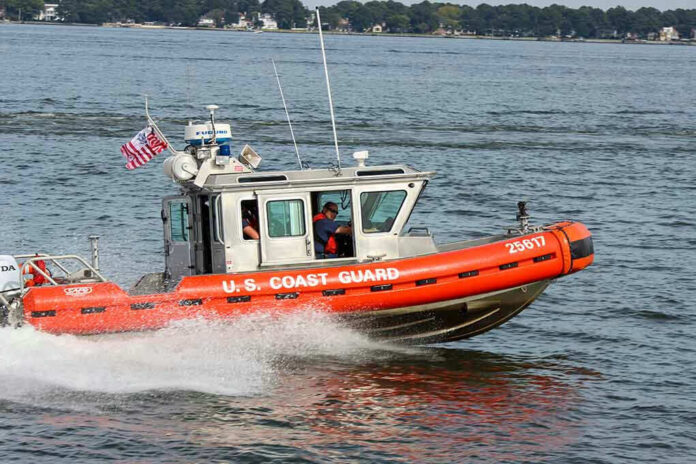
Congress is about to hand the Coast Guard a staggering $25 billion budget surge and a brand-new Secretary, all while the border crisis barrels on and Americans foot the bill for priorities that seem to change with the political winds.
At a Glance
- Coast Guard Authorization Act of 2025 advances with bipartisan support and nearly $25 billion in new funding
- Creation of a Secretary of the Coast Guard position, elevating bureaucratic power and reshaping leadership
- Lawmakers tout focus on border security, drug interdiction, and modernization amid ongoing illegal immigration crisis
- Questions rise about spending priorities as inflation and taxpayer frustration deepen
Congress Greenlights Coast Guard Expansion—But At What Cost?
Washington’s latest move: supercharging the Coast Guard’s budget and bureaucracy while the rest of us wrestle with soaring grocery bills and a border that’s still leaking like a sieve. On March 6, 2025, the Senate passed the Coast Guard Authorization Act of 2025 without a peep of dissent—unanimous, as if there’s suddenly no debate about $25 billion in new spending. The House is now rumbling forward with its own version, H.R.4275, debating all the bells and whistles that come with this legislative behemoth. Lawmakers from both parties are tripping over themselves to claim credit for “border security” and “modernization,” but Americans watching their paychecks shrink have seen this show before.
The bill doesn’t just shovel money into Coast Guard coffers. It establishes the Secretary of the Coast Guard—a shiny new cabinet-level post for another Washington insider. Because clearly what the federal government needs right now is more bureaucracy, not less. The legislation authorizes appropriations through 2029, a half-decade’s worth of funding commitments locked in before a single ship is built or a single criminal is hauled off the high seas. Congressional leaders like Sen. Ted Cruz and Sen. Maria Cantwell have been out front, insisting this is a response to evolving threats and technological advancements, like autonomous smuggling vessels. Their talking points hit all the right notes—border security, drug interdiction, disaster response—but the details reveal a classic Washington power play: money, bureaucracy, and promises of “better days ahead.”
A Border Crisis, Ballooning Budgets, and Bipartisan Amnesia
Let’s talk about the backdrop. While Congress pats itself on the back for “leadership,” the southern border continues to churn with chaos. Sure, the Biden and Trump administrations have both rolled out new policies, and CBP claims a 93% drop in border apprehensions in the past year. But every American who’s seen their community change, their taxes rise, or their emergency rooms fill up knows the reality is not as rosy as Capitol Hill wants us to believe. The same politicians pushing this Act are also the ones who’ve presided over years of border negligence, allowing illegal crossings to spike, only to scramble at election time to look “tough.”
Meanwhile, the House’s 2025 reconciliation bill is throwing billions at states for “border-related enforcement.” Texas is set to rake in federal reimbursements for its Operation Lone Star, already a $11 billion taxpayer tab. But don’t think for a second that this signals a return to sanity; the federal government also wants to eliminate grants to states and localities that help newly-arrived migrants, even as it funds the massive state enforcement apparatus. Washington can’t seem to pick a priority, but it sure can print money—leaving taxpayers holding the bag as inflation eats away at what’s left of their savings.
Modernization or Mission Creep? Americans Deserve Accountability
Coast Guard leaders and their congressional boosters argue this is about “modernization.” They want new ships, aircraft, blimp-based radar, and advanced surveillance to counter everything from drug smugglers to potential threats off Hawaii’s coast. No one denies the men and women of the Coast Guard do heroic work. But let’s not kid ourselves: this is about empire-building in the name of “security.” More bureaucrats, more federal reach, and more taxpayer dollars funneled into programs that may or may not deliver on their promises. The Act’s backers promise economic benefits—jobs in shipbuilding, local port investment, a safer maritime industry. Yet the reality for most Americans: more government, more spending, and precious little relief from the daily grind of rising prices, stagnant wages, and a political class that seems determined to prioritize everything but the people footing the bill.
The Coast Guard Authorization Act’s supporters insist this is a bipartisan win, a sign that Congress can still “get things done.” But with every new layer of bureaucracy and billion-dollar spending binge, Americans are left to wonder: Who, exactly, is Congress working for? The families struggling to afford groceries and gas, or the Beltway insiders who always seem to come out ahead—no matter which party is in charge? The answer, as always, is hiding in plain sight: follow the money, and you’ll see where Washington’s true priorities lie.












